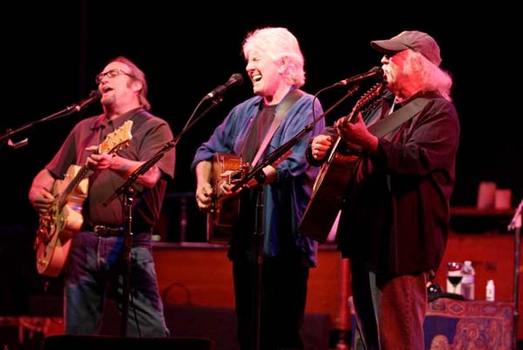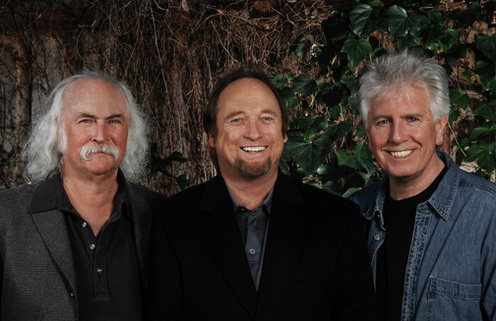Conjuring a Woodstock spirit
Published in Berkshire Eagle, 8/31/10

By Jeremy D. Goodwin
LENOX—Crosby Stills and Nash, or CSN for short, was born in the crucible of Woodstock. That's true in terms of cultural impact—the group seems a perpetual ambassador of the America of the late 1960’s—and the reality of its origin story. One of the band's very first gigs was in front of about 500,000 at that iconic music and arts festival, and its soaring triumph there, despite some obvious nerves, is one of the great pleasures of the classic concert film documenting that event.
Though its sometimes-collaborator Neil Young continues spitting out albums and launching projects, some of more artistic and cultural import than others, CSN makes no pretense of having something new to say in 2010. Its last studio album came in 1999, and it hasn't had the triple-headed intensity of its most vital work since, arguably, "Daylight Again" in 1982 or even "CSN" in 1977.
Sure, thirty years is a long time to coast on your laurels. But at its essence, CSN is about craft, and a peerless legacy of recorded work. And as long as, most crucially, their vocal pipes can continue to effect a convincing version of the so-sweet harmonies that define the band's sound, a well-played greatest hits concert by David Crosby, Steven Stills and Graham Nash holds as much promise as one by just about any of their generation. The group plays the Shed at Tanglewood tomorrow night.
Each of its members had achieved success before this particular band, making it something of a supergroup from the outset. Its major work spilled out in a dizzying trio of albums—the self-titled debut in 1969, Déjà vu in 1970, and epic live album 4 Way Street in 1971. Young was on hand for the latter two, contributing an electricity that scuffed up the group’s signature prettiness and lured out Still’s crackling electric guitar playing, serving as a foil through long workouts of Young tunes like “Southern Man.”
With arrows in the quiver like "Teach Your Children," "Our House," "Suite: Judy Blue Eyes," and "Carry On," not to mention the definitive cover of Joni Mitchell’s “Woodstock,” CSN are a veritable one-stop shop for the soundtrack of any film seeking to conjure the spirit of the Woodstock generation. (Later-career gems "Southern Cross" and "Wasted on the Way" fill out the list of indispensable tunes.) The work reflects the generational shift at play in that time, as well as the countercultural social currents and political strife that went far to characterize the era. In just a few short years, the group reflected both the idealism and the disappointment of a time, and somehow even its later work seems defined as the testament of a survivor looking backwards. Many of the other bands that shared the bill at Woodstock—The Who, The Grateful Dead, Santana, The Band—came to prominence in the late-60’s but went on to assimilate the flavor of later cultural epochs. CSN, it can be argued, never lost the flavor of its founding episode.
LENOX—Crosby Stills and Nash, or CSN for short, was born in the crucible of Woodstock. That's true in terms of cultural impact—the group seems a perpetual ambassador of the America of the late 1960’s—and the reality of its origin story. One of the band's very first gigs was in front of about 500,000 at that iconic music and arts festival, and its soaring triumph there, despite some obvious nerves, is one of the great pleasures of the classic concert film documenting that event.
Though its sometimes-collaborator Neil Young continues spitting out albums and launching projects, some of more artistic and cultural import than others, CSN makes no pretense of having something new to say in 2010. Its last studio album came in 1999, and it hasn't had the triple-headed intensity of its most vital work since, arguably, "Daylight Again" in 1982 or even "CSN" in 1977.
Sure, thirty years is a long time to coast on your laurels. But at its essence, CSN is about craft, and a peerless legacy of recorded work. And as long as, most crucially, their vocal pipes can continue to effect a convincing version of the so-sweet harmonies that define the band's sound, a well-played greatest hits concert by David Crosby, Steven Stills and Graham Nash holds as much promise as one by just about any of their generation. The group plays the Shed at Tanglewood tomorrow night.
Each of its members had achieved success before this particular band, making it something of a supergroup from the outset. Its major work spilled out in a dizzying trio of albums—the self-titled debut in 1969, Déjà vu in 1970, and epic live album 4 Way Street in 1971. Young was on hand for the latter two, contributing an electricity that scuffed up the group’s signature prettiness and lured out Still’s crackling electric guitar playing, serving as a foil through long workouts of Young tunes like “Southern Man.”
With arrows in the quiver like "Teach Your Children," "Our House," "Suite: Judy Blue Eyes," and "Carry On," not to mention the definitive cover of Joni Mitchell’s “Woodstock,” CSN are a veritable one-stop shop for the soundtrack of any film seeking to conjure the spirit of the Woodstock generation. (Later-career gems "Southern Cross" and "Wasted on the Way" fill out the list of indispensable tunes.) The work reflects the generational shift at play in that time, as well as the countercultural social currents and political strife that went far to characterize the era. In just a few short years, the group reflected both the idealism and the disappointment of a time, and somehow even its later work seems defined as the testament of a survivor looking backwards. Many of the other bands that shared the bill at Woodstock—The Who, The Grateful Dead, Santana, The Band—came to prominence in the late-60’s but went on to assimilate the flavor of later cultural epochs. CSN, it can be argued, never lost the flavor of its founding episode.

After a phenomenal success with its debut album, the band came back with a highly anticipated sophomore effort (this time with Young on board as a fully credited band-member) that topped the charts and did much to define an era.Young’s presence was thought to be particularly fractious, but even when he wasn’t in the picture, CSN was known as one of those bands that created its best music almost in spite of itself. With four distinctive personalities and sometimes-clashing creative dynamos collaborating toward some sort of whole, CSN’s landmark sophomore album was assembled almost like four concurrent solo projects. (A parallel can be seen with The Beatles’ “White Album,” recorded around the same time.) The end effect was one of the great feats of legerdemain in rock, with the four voices (literally) blending into a gorgeous tapestry of high harmonies and folksy songwriting underpinned by a bit of electric spitfire. The unit was firing on all cylinders for the double-album Four Way Street, stocked with somewhat dated fare like Nash’s choppy-but-pretty piano turn on “Chicago” as well as impossibly pretty articulations of the band’s best work—and those winding, electric instrumental excursions.
All four hands were on deck for a 1974 American tour that featured no new material, but there were no additions to the CSN studio oeuvre until 1977’s CSN, a worthy addition to the catalog but the band’s last work with only the three principle voices creating those trademark harmonies. (The core trio was regularly supplemented by other band members, especially in concert, but the signature vocals had been their own work alone.) On a scattershot series of albums that followed, studio hands were on deck to fill out the sound, and CSN would occasionally work with Young again, including on 1999 album Looking Forward and an arena reunion tour in 2000.
Its members are now nearing 70, and its mission is firmly one of re-creating a sound from days gone by. The enduring draw of that name—Crosby, Stills and Nash—speaks to the group’s indelible impact on the rock and roll of a particular time and place. They are survivors, and the fact they’re indeed still on the road and pleasing audiences should not be glossed over. When they stake the stage at Tanglewood tomorrow, it’s possible the harmonies won’t be as sweet, or the memories as crisp as they once were. But in any shape or form, CSN will manage to conjure the essence of an era—and while that may not make the group unique, it places it in a very elite club.
All four hands were on deck for a 1974 American tour that featured no new material, but there were no additions to the CSN studio oeuvre until 1977’s CSN, a worthy addition to the catalog but the band’s last work with only the three principle voices creating those trademark harmonies. (The core trio was regularly supplemented by other band members, especially in concert, but the signature vocals had been their own work alone.) On a scattershot series of albums that followed, studio hands were on deck to fill out the sound, and CSN would occasionally work with Young again, including on 1999 album Looking Forward and an arena reunion tour in 2000.
Its members are now nearing 70, and its mission is firmly one of re-creating a sound from days gone by. The enduring draw of that name—Crosby, Stills and Nash—speaks to the group’s indelible impact on the rock and roll of a particular time and place. They are survivors, and the fact they’re indeed still on the road and pleasing audiences should not be glossed over. When they stake the stage at Tanglewood tomorrow, it’s possible the harmonies won’t be as sweet, or the memories as crisp as they once were. But in any shape or form, CSN will manage to conjure the essence of an era—and while that may not make the group unique, it places it in a very elite club.
